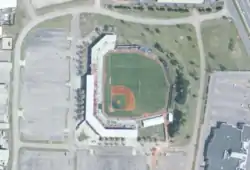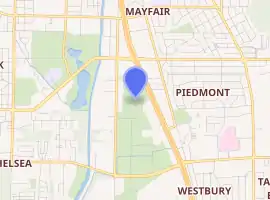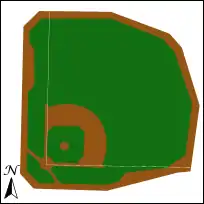Joe W. Davis Stadium
Joe W. Davis Stadium is a minor league baseball park in Huntsville, Alabama, United States, which hosted the Huntsville Stars of the Southern League from 1985 until 2014, and then served as a temporary home for the Stars' successor (the Biloxi Shuckers) in 2015.
"The Joe" | |
 | |

| |
| Full name | Joe W. Davis Municipal Stadium |
|---|---|
| Location | 3125 Leeman Ferry Road Huntsville, Alabama 35801 |
| Coordinates | 34°41′58.49″N 86°35′18.59″W |
| Owner | City of Huntsville |
| Capacity | 10,488 |
| Field size | Left Field: 345 feet (105 m) Center Field: 405 feet (123 m) Right Field: 330 feet (101 m) |
| Surface | Bermudagrass (Tifway 419) |
| Construction | |
| Broke ground | September 21, 1984[1] |
| Built | 1984–1985 |
| Opened | April 19, 1985[2] |
| Renovated | 2004–2007 |
| Closed | May 25, 2015 (final game) |
| Construction cost | $7.6 million ($18.1 million in 2019 dollars[3]) |
| Architect | Goodrum Knowles Inc. |
| Tenants | |
| Huntsville Stars (SL) (1985–2014) UAH Chargers (NCAA baseball) (1996–2010) Biloxi Shuckers (SL) (2015) | |
Built in 1985, the stadium is located on the grounds of Huntsville's former airport, adjacent to Huntsville's main north–south thoroughfare, U.S. Highway 231 (S. Memorial Parkway).[4] The stadium is a multi-purpose facility that seats 10,488 with 15 air-conditioned skyboxes. Ticket offices and the general office are located on the second floor of the stadium. Closed circuit television above the main concourse allows for viewing of the game while grabbing a bite at the concession stands. In addition to baseball, Joe W. Davis Stadium has been used for high school football, monster truck rallies, and concerts.
Nicknamed "The Crown Jewel of the Southern League" upon its construction, the stadium was the oldest venue in the league during its final year of operation.
History
The stadium is named for the longtime mayor of Huntsville, Joe W. Davis, who was instrumental in the city's efforts to construct the stadium. Construction came about in 1984 after Nashville Sounds owner Larry Schmittou purchased the Evansville Triplets with the intent of moving the team in 1985 to Nashville, Tennessee to effectively elevate his Double-A Sounds to the Triple-A level. As a result of this move, the existing Double-A franchise needed a new home. Schmittou considered a swap, which would have sent the Double-A team to Evansville, Indiana to replace the Triplets. Evansville city leaders balked at the requested stadium upgrades, leading Schmittou to seek alternate arrangements, which resulted in the franchise's move to Huntsville. The team became known as the Huntsville Stars, and Schmittou continued to own the franchise until selling it to a local ownership group in 1994.
The first game was held on April 19, 1985. The Stars defeated the Birmingham Barons 10-0 in a game that included a grand slam from future major-leaguer Jose Canseco.[5]
On July 10, 1991, the ballpark hosted the first Double-A All-Star Game. A team of American League-affiliated All-Stars defeated a team of National League-affiliated All-Stars, 8–2, before 4,022 people in attendance.[6]
In the mid-2000s, renovations began on the stadium, including the replacement of all the stadium's box seats. In 2004, Joe Davis Stadium's current scoreboard, a 36-by-48-foot scoreboard complete with LED numbering and a 12-by-18-foot videoboard, was installed.
In 2014, the Stars were sold to an ownership group with the intent of relocating the franchise to Biloxi, Mississippi at the end of the season.[7] The sale followed years of failed attempts to secure a new ballpark for the team in Huntsville.[8] However, due to construction delays preventing the new Biloxi stadium from being completed in time for the Southern League's 2015 opening day, and because the franchise was still operating under a lease to use Joe Davis Stadium, the newly-christened Biloxi Shuckers played 15 of its first 25 scheduled home games in Huntsville.[5] (The remaining ten home games were played with Biloxi acting as the home team on its opponents' home fields.)
The final game at Joe Davis Stadium was played on May 25, 2015 – a 7-2 rain-shortened win for the Shuckers over the Barons.[9]
Soon after the last game, the Huntsville city administrator said that the stadium would be razed later in 2015,[5] but its fate was still being debated in May of 2018.[10]
In November 2019, the City of Huntsville began implementing plans to renovate the stadium into a multi-use facility,[11] awarding an architectural contract for the design and construction documents needed to put the project out for bid.[12]
Field diagram

References
- The American City & County. 100. New York City: Morgan-Grampian Publishing Company. 1985. p. 134.
- Knight, Graham (June 9, 2010). "Joe Davis Stadium". Baseball Pilgrimages. Retrieved September 18, 2011.
- Federal Reserve Bank of Minneapolis. "Consumer Price Index (estimate) 1800–". Retrieved January 1, 2020.
- Freeman, Paul. "Huntsville Airport (2nd location), Huntsville, AL". Abandoned and Little-Known Airfields. Retrieved September 25, 2012.
- McCarter, Mark (May 29, 2015). "Biloxi's U-turn on Shuckers' starting date pronounces end to Huntsville's pro baseball era". AL.com. Retrieved May 30, 2015.
- "SL Sets First All-Star Tilt". The Orlando Sentinel. Orlando. July 11, 1991. p. B-4 – via Newspapers.com.
- Fordin, Spencer (September 17, 2014). "Brewers renew contracts with Biloxi, Brevard County". MLB.com. Retrieved September 17, 2014.
- "It's Official: Huntsville Stars Sold, Expected to Move to Biloxi in 2015". Ballpark Digest. January 11, 2014. Retrieved January 11, 2014.
- "Birmingham vs. Biloxi - May 25, 2015 | Biloxi Shuckers Box". Biloxi Shuckers. Retrieved January 9, 2020.
- Spedden, Zach (May 22, 2018). "Joe Davis Stadium's Future Uncertain". Ballpark Digest. August Publications. Retrieved September 7, 2018.
- Spedden, Zach (November 8, 2019). "Joe Davis Stadium Renovation Plans Move Forward". Ballpark Digest. August Publications.
- "Huntsville moves to renovate Joe Davis Stadium for football, soccer, lacrosse". WAFF 48. November 7, 2019. Retrieved May 9, 2020.
External links
- Stadium Page at Huntsvillestars.com
- Joe W. Davis Municipal Stadium Views - Ball Parks of the Minor Leagues
- Alabama-Huntsville Chargers Profile
| Wikimedia Commons has media related to Joe Davis Stadium. |